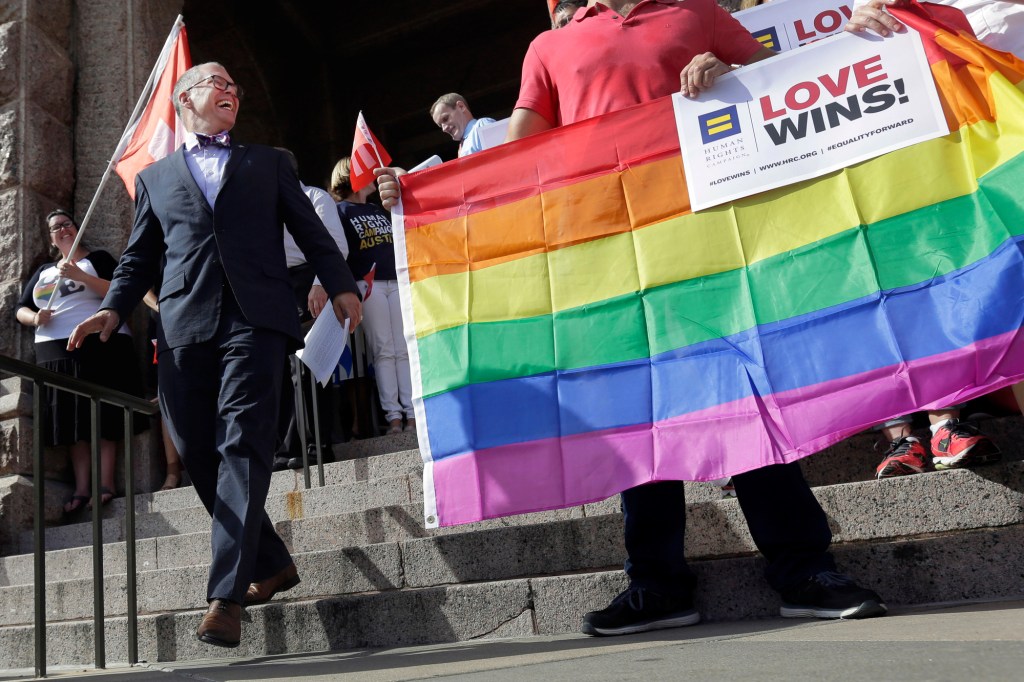
Abigail Adams, America’s second First Lady, famously urged her husband at the Continental Congress in 1776 to “remember the ladies,” entreating him to be “more more generous and favorable to them than your ancestors.” That same spirit — to broaden our embrace of liberty with each generation — has marked the arc of American progress. From immigrants to Black Americans, women to Native Americans, the nation has moved, however imperfectly, toward equal opportunity for all.
Most recently, this mentality led to the Obergefell vs. Hodges decision and the Respect for Marriage Act recognizing the right to marriage and adoption between same-sex couples. Public opinion shows Americans overwhelmingly support gay marriage rights and anti-discrimination laws across lines of partisan difference.
Yet today, that spirit is too often forgotten by otherwise Constitution-gripping voices on the right when it comes to their gay neighbors.
Fears about falling birth rates have inspired well-meaning efforts to promote family policy — but outdated ideas about what a “family” is still linger in the conversation. As lawmakers across the aisle consider a number of policies, serious discussions on tax credits or childcare get drowned out by the noise of hate-fueled rhetoric toward gay couples and their families.
Podcaster Matt Walsh has gone so far as to suggest that children would be better off one of the hundreds of thousands of American children in foster care — or even as amputees — than be raised by same-sex parents. Author Allie Beth Stuckey equates gay marriage with youth transition surgery — invoking a slippery slope fallacy, naturally. The Gospel Coalition, a non-denominational Evangelical organization, outright declares the Obergefell ruling to be “on the wrong side of history,” claiming that same-sex relationships are unnatural and incapable of raising loving, flourishing families.
None of these claims are true. Children raised by same-sex couples live happy, healthy and successful lives like those raised by straight couples. As a matter of fact, same-sex households are oftentimes wealthier while gay men tend to be more college-educated. Same-sex couples are also vastly more likely to adopt or raise foster children, giving tens of thousands of American children a home. But regardless of sexuality and adoptive status, parents across this country share the same concerns: affordability, education and work-life balance.
Today, families are struggling with the cost of everyday groceries and housing with compounding inflation, personal debt and supply shortages. Bills don’t discriminate. Even with higher on-average incomes, gay parents face the same challenges of the modern economy as straight ones — from student loan repayments to a carton of eggs.
By nature, all parents want their children to receive a quality education with a safe learning environment and access to extracurriculars in the arts or athletics. This shared desire for academic achievement thrives in families of same-sex couples. Children raised by same-sex couples have been shown to have better performance in K-12 educational attainment, standardized testing, high school graduation rates and college enrollment.
And in wake of pandemic era shifts toward remote and hybrid workplaces, the perpetual deliberation over choices in parenting, work arrangements and childcare continues for all American parents. Gay and straight couples face similar choices: Do I become a stay-at-home mom or dad? Join a big company with daycare and maternity leave benefits? Take on a remote part-time role?
Making both public policy and our culture alike more family friendly means including all families, including those who do not look like yours or may live by different virtues. American parents want greater economic mobility, better schools and to carefully balance their career ambitions with family life. Debates over what that looks like — deregulation vs. subsidies, classical vs. career-based education and flexible vs. employer-based benefits — need to include gay and straight parents alike.
Voices seeking to ostracize the gays from discussions on how to uplift parents should be shown the door. This conversation deserves grown-up leadership.
America is a pluralistic society where citizens are guaranteed the freedom of religion, association and, yes, marriage. The United States government is meant to serve us all. By extension, our cultural heritage is meant to reflect the richness of that diversity.
If the conservative movement is serious about preserving the American family, it must include all American families — not just those conformed to a narrow historical mold.
Gay Americans are not outsiders to be demonized. They are friends, taxpayers, parents, fellow citizens and voters. You see them at school drop-offs, the town swimming pool or Fourth of July parade. Just like you, gay parents love their kids and their country.
The Republican coalition faces a choice: uphold shared values and build a coalition that speaks to the whole country, or retreat into a politics of resentment and paranoia. One path calls us to political courage and more clarity. The other trades persuasion for provocation, and risks shrinking the very coalition needed to survive.
Sam Raus is the David Boaz Resident Writing Fellow at Young Voices, a political analyst and public relations professional. Follow him on X: @SamRaus1.



